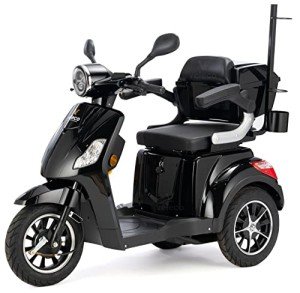Mobility Scooters: A Comprehensive Guide
Mobility scooters have become an important mode of transportation for many individuals facing mobility challenges. best mobility scooters out the different aspects of mobility scooters, including their types, benefits, functions, and a guide for prospective purchasers.
Comprehending Mobility Scooters
Mobility scooters are electrically powered devices designed for people with minimal mobility. They supply a way of transport for people who may have problem walking however still wish to maintain their self-reliance. They are available in various styles and features to accommodate a vast array of requirements.
Types of Mobility Scooters
Mobility scooters can generally be categorized into 3 main types:
| Type | Description | Best For |
|---|---|---|
| Compact Scooters | These are small and lightweight, ideal for indoors and short journeys. | Users with minimal storage space or those who travel often. |
| Mid-size Scooters | A balance between portability and stability, ideal for both indoor and outside usage. | Those who require to cover a range of surfaces. |
| Sturdy Scooters | Big and robust, designed for rugged outdoor usage and much heavier people. | Users needing extra weight capacity or going off-road. |
Key Features of Mobility Scooters
The option of mobility scooter typically depends on the functions that line up with specific requirements. Here are some of the key features to consider:
- Weight Capacity: Mobility scooters come with different weight limits. It is important to choose a scooter that can effectively support the user's weight.
- Variety: The distance a scooter can travel on a single charge varies. Depending upon user needs, one might select scooters with a variety of approximately 40 miles.
- Speed: Most mobility scooters can reach speeds in between 4 to 8 mph. Consider what speed is comfortable and safe for the designated environment.
- Turning Radius: A compact turning radius is necessary for indoor use, permitting simpler navigation in tight areas.
- Battery Type: The type of batteries utilized can affect the scooter's performance. Lead-acid and lithium-ion batteries are the most common.
Advantages of Using Mobility Scooters
The benefits of mobility scooters extend beyond just transportation. Some key benefits include:
- Independence: Users can navigate their environment without relying on caretakers, promoting independence and self-confidence.
- Health Benefits: Using a scooter can encourage outdoor activity, resulting in physical and psychological health improvements by lowering feelings of isolation.
- Convenience: Scooters can easily be operated in numerous environments, whether inside, in shopping malls, or outdoors.
Crucial Considerations When Buying a Mobility Scooter
When acquiring a mobility scooter, a number of factors to consider can assist make sure that you choose the right design:
Assess Individual Needs:
- Mobility level: Consider how much help the person will require.
- Variety of usage: Determine where the scooter will primarily be utilized (inside, outdoors, on rough terrains, and so on).
Test Drive:
- Always test drive a number of models to find an appropriate fit. Pay attention to comfort, ease of steering, and the scooter's responsiveness.
Review Safety Features:
- Look for scooters with appropriate security functions like lights, signs, and anti-tip designs.
Inspect Warranty and Service Options:
- A reliable warranty and readily available service choices are vital for long-term usage.
Frequently Asked Questions about Mobility Scooters
1. How fast do mobility scooters go?Mobility scooters normally have speeds varying from 4 to 8 mph, with a lot of designed for security rather than high-speed travel. 2. Exist weight restrictions on mobility scooters?Yes, mobility
scooters come with particular weight limits, typically ranging from
250 lbs to over 500 lbs, depending on the design. 3. Can mobility scooters be utilized indoors?Certain designs, especially compact scooters, are specifically developed for
indoor use and are much easier to steer in tight areas. 4. How frequently do the batteries require to be replaced?Battery life can vary based upon use, but generally, with proper care, batteries may last between 1 to 3 years before requiring replacement
. 5. Are mobility scooters covered by insurance?Coverage can vary, however some insurance strategies, including Medicare and Medicaid, may cover part of the expense. It's recommended to talk to individual insurance companies. Mobility scooters act as a
important tool for many individuals, enabling them to preserve
their freedom and self-reliance. By comprehending the different types and functions of mobility scooters, individuals can make informed decisions customized to their specific needs.
Whether utilized for errands, mingling, or leisurely activities, mobility scooters can improve the lifestyle for those with mobility constraints. Investing in a mobility scooter is a choice that can significantly affect a person's every day life. For that reason, people should carefully examine their alternatives and select a model that best lines up with their lifestyle and mobility requirements
.

